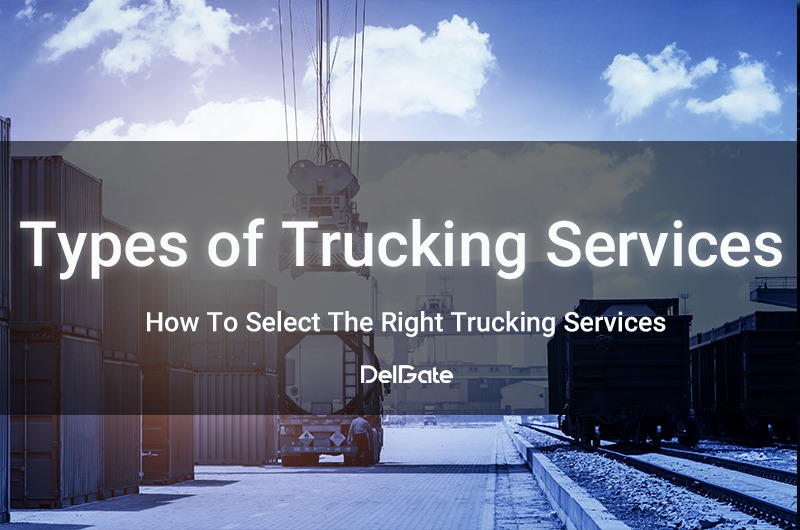In today’s fast-paced, interconnected economy, the efficiency of your supply chain hinges heavily on choosing the right types of trucking service. Whether you’re running a local retail store, an e-commerce platform, or a multinational manufacturing company, understanding the nuances of various trucking options is key to optimizing your logistics, controlling costs, and ensuring timely delivery.
The landscape of freight transportation in Canada is diverse, featuring a range of services tailored to different industries, cargo types, and delivery speeds. From dedicated FTL shipments to flexible LTL shipping options, and from rapid same-day delivery in Canada to complex transloading, the choices are numerous but can be overwhelming without proper guidance.
This comprehensive guide aims to demystify the various types of trucking service, highlight their benefits, and help you determine which solutions best fit your specific shipping needs. We will explore how industry leaders like DelGate, Canada’s premier 3PL, leverage these services to deliver value to their clients. Whether your priority is cost savings, speed, flexibility, or scalability, this article will serve as your roadmap to smarter logistics decisions.
Table of Contents
The Critical Role of Choosing the Right Types of Trucking Service

In the realm of logistics, choosing the right trucking service isn’t merely about moving goods from point A to B. It’s about optimizing your entire supply chain — reducing costs, improving reliability, and enhancing customer satisfaction. A misaligned choice can lead to increased transit times, damaged goods, or excessive expenses, hampering your reputation and profitability.
Every business has unique needs: some require ultra-fast same-day delivery in Canada for perishable items; others may prioritize cost-effective LTL shipping for non-urgent freight; some might need complex transloading for international shipments. Properly understanding these options and how they fit into your logistics strategy can make all the difference.
In this guide, we’ll look deeply into each types of trucking service, providing insights into when and why you should consider each, supported by real-world examples, case studies, industry data, and a clear understanding of the various types of trucking service available to meet your specific needs.
Canada 3PL and Fulfillment Solutions: Driving Force Behind Today’s Advanced Logistics
In the contemporary supply chain, third-party logistics providers (Canada 3PL) like DelGate have revolutionized how businesses manage their transportation and warehousing. These providers offer an integrated suite of fulfillment services in Canada, combining warehousing, inventory management, transportation, and distribution under one roof, allowing companies to focus on their core competencies while leaving logistics to experts.
What Does a Canada 3PL Do?
- Warehousing and Inventory Management: They operate extensive 3PL warehouses in Canada, equipped with advanced inventory control systems, ensuring real-time stock visibility.
- Order Fulfillment: Picking, packing, and shipping orders efficiently using various types of trucking service.
- Transportation Management: Choosing the optimal trucking logistics services for each shipment, whether it’s FTL, LTL, or expedited courier.
- Returns Handling: Managing reverse logistics, which is crucial for e-commerce businesses.
Why Partner with a 3PL?
Collaborating with a Canadian 3PL such as DelGate provides a wide range of valuable benefits:
- Cost Efficiency: Through volume discounts, optimized routes, and consolidated shipments.
- Scalability: Easily scale operations up or down based on demand fluctuations.
- Technology: Access to advanced tracking, analytics, and seamless order management systems.
- Expertise: Deep understanding of trucking rates in Canada, customs regulations, and industry best practices.
Success Story
A mid-sized Canadian retailer specializing in organic foods partnered with DelGate for their fulfillment needs. By leveraging Types of Trucking Service such as transloading in Canada and strategic cross-docking services in Canada, they reduced transit times by 15%, minimized storage costs, and improved delivery reliability, leading to higher customer satisfaction and increased repeat orders.
Exploring the Top Types of Trucking Service in Canada
The diversity of types of trucking service available in Canada reflects the complex needs of modern commerce. Let’s explore these options in detail, highlighting their key features, advantages, and ideal use cases.
1. Full Truck Load (FTL): Dedicated Capacity for Large Shipments
Full truck load remains the backbone of freight transportation, especially for large, high-value, or sensitive cargo. When your shipment volume fills an entire truck—or nearly so—FTL offers a dedicated, secure, and efficient solution.
Advantages of FTL:
- Speed: No stops or transfers, leading to faster transit times.
- Security: Cargo is not mixed with other shipments, reducing theft or damage risks.
- Flexibility: Precise scheduling tailored to your delivery window.
- Cost-effectiveness: For large shipments, it often works out cheaper per unit compared to other options.
Ideal for:
- Manufacturing bulk raw materials.
- Perishable goods needing refrigeration.
- High-value electronics or fragile items.
- Critical industrial equipment.
Case Study: A major automotive parts manufacturer used FTL services, a key Type of Trucking Service, from DelGate to distribute components across Canada. By coordinating dedicated FTL shipments, they reduced transit times by 20% and cut costs associated with multiple smaller shipments.
2. Less Than Truckload (LTL) Shipping in Canada: Cost-Effective for Smaller Shipments
LTL shipping consolidates freight from multiple shippers into a single truck, sharing space and costs. This flexibility makes it ideal for smaller, less urgent shipments.
Advantages of LTL:
- Cost Savings: Pay only for the space and weight used.
- Flexibility: Schedule frequent pickups and deliveries.
- Reduced Inventory Costs: Smaller shipments mean less warehousing.
- Environmental Benefits: Consolidated freight reduces carbon footprint.
Best suited for:
- Retail stock replenishment.
- E-commerce parcel shipments.
- Small business deliveries.
Example: An online fashion retailer used Types of Trucking Service like LTL shipping to distribute new collections to multiple stores across Canada. Their logistics partner optimized routes, reducing delivery costs by 15% and improving delivery times.
3. Courier Services in Canada: Speed and Precision for Urgent Deliveries
When speed is critical, courier services in Canada excel. These services handle small parcels, documents, and high-priority shipments, often delivering within the same day or the next.
Advantages:
- Rapid Delivery: Same-day or next-day options.
- Tracking & Security: Real-time updates and secure handling.
- Specialized Handling: Perishable, fragile, or high-value items.
Use Cases:
- Medical supplies.
- Legal documents.
- E-commerce express shipping.
- Emergency parts replacement.
Example: A medical equipment supplier utilized courier services in Canada for urgent delivery of emergency ventilators. Their logistics provider coordinated same-day delivery in Canada, saving lives and maintaining critical operations.
4. Transloading in Canada: Intermodal Flexibility for International and Long-Distance Freight
Transloading is the process of shifting cargo between different transportation methods, like moving freight from rail to truck, and is a crucial form of trucking service. It enables companies to leverage the most efficient and cost-effective transportation modes.
Advantages:
- Cost Efficiency: Lower costs over long distances.
- Flexibility: Easier to access remote or inland locations.
- Reduced Transit Times: Strategic transfers can shave days off transit.
Ideal for:
- International shipments arriving by sea or rail.
- Bulk commodities.
- International exporters/importers.
Case Study: A Canadian importer used transloading to switch containerized ocean freight from port to rail, then to trucks for inland delivery. This process saved 10% on overall freight costs and reduced transit times by 3 days.
5. Cross-Docking Services in Canada: Streamlined Distribution for Retail and Perishables

Cross-docking minimizes storage needs by transferring goods directly from inbound to outbound trucks, reducing warehousing costs and speeding up delivery cycles.
Advantages:
- Reduced Inventory Holding.
- Faster Delivery: Critical for perishable goods.
- Lower Warehousing Costs.
- Improved Supply Chain Efficiency.
Best suited for:
- Retail distribution centers.
- Perishable food products.
- High-volume consumer goods.
Example: A retail chain employed cross-docking services in Canada to expedite the distribution of fresh produce, reducing delivery times by 24 hours and cutting storage costs by 12%.
6. Same-Day Delivery in Canada: Meeting Customer Expectations
In today’s competitive landscape, same-day delivery in Canada has become a standard expectation, especially in urban areas. It requires well-coordinated logistics and reliable trucking logistics services.
Advantages:
- Customer Satisfaction: Fast response times.
- Competitive Edge: Stand out in e-commerce.
- Flexibility: Handle urgent orders efficiently.
Industries:
- Medical supplies.
- E-commerce.
- Food delivery.
- Retail.
Example: A Canadian pharmacy chain used Types of Trucking Service, such as same-day delivery, to ensure critical medications reached patients promptly. Their partnership with DelGate enabled real-time tracking and rapid response, boosting customer loyalty.
7. Two-Day Shipping: A Balance Between Speed and Cost
Two-day shipping offers a reliable middle ground, appealing to customers seeking quick delivery without the premium cost of same-day delivery.
Advantages:
- Predictable delivery window.
- Cost-effective.
- Suitable for non-urgent shipments.
Use Cases:
- Business supplies.
- Retail stock replenishment.
- E-commerce orders.
Example: An electronics retailer adopted fastest shipping in Canada for nationwide orders, maintaining competitive delivery times while controlling logistics expenses.
8. Freight Forwarding Services: Multi-Modal, International Shipping Simplified
Freight forwarding involves coordinating complex shipments across various transportation modes—air, sea, rail, and truck—for international trade.
Advantages:
- Customs clearance expertise.
- Multi-modal optimization.
- Cost savings through consolidated shipments.
Ideal for:
- International exports/imports.
- Large industrial equipment.
- Perishable international goods.
Case Study: A Canadian exporter used freight forwarding services, including various Types of Trucking Service, to ship machinery to Europe, combining ocean freight with transloading for inland delivery, saving 18% on total transportation costs.
9. Flat Rate Shipping in Canada: Simplified Cost Structure for Small Parcels
Flat Rate Shipping in Canada simplifies budgeting by offering predictable, fixed costs regardless of weight or distance, ideal for small and medium shipments.
Advantages:
- Billing certainty.
- Easy to plan expenses.
- Ideal for e-commerce and small business.
Integrating Trucking Logistics Services for an Optimized Supply Chain
The key to successful logistics is integration. Trucking logistics services encompass route planning, freight consolidation, compliance, and tracking, ensuring your shipments are coordinated and efficient.
How Logistics Providers Enhance Your Supply Chain
- Route Optimization: Reducing transit times and fuel costs.
- Real-Time Tracking: Visibility into shipment status.
- Freight Consolidation: Combining shipments to reduce costs.
- Customs & Compliance: Navigating international regulations smoothly.
Case Study: Logistics Optimization
A Canadian furniture retailer faced delays in delivering products across provinces. Partnering with DelGate, they adopted various Types of Trucking Service, such as cross-docking and transloading, which cut their delivery times by 22%, reduced warehousing costs by 15%, and greatly improved customer satisfaction.
How to Choose the Right Types of Trucking Service
Making the right choice depends on multiple factors:
- Shipment Size and Weight: Large, heavy cargo favors FTL smaller shipments benefit from LTL.
- Delivery Speed: Urgent needs call for same-day or two-day shipping.
- Cost Sensitivity: Budget constraints might favor LTL or flat rate shipping.
- Cargo Sensitivity: Fragile or perishable goods require specialized trucking logistics services.
- Destination and Route: Remote or international locations require transloading or freight forwarding.
Practical Tips
- Conduct a cost-benefit analysis.
- Consult logistics experts like DelGate.
- Consider scalability for future growth.
- Use data analytics and real-time tracking.
Exploring the Future Trends in Canadian Trucking Services

The logistics industry is rapidly evolving, driven by technology and changing consumer expectations. Here’s what the future holds:
- Automation & AI: Smarter route planning and autonomous trucks.
- Electric & Green Trucks: Reducing carbon footprints.
- Blockchain & Data Security: Improving transparency.
- Integration with E-Commerce Platforms: Seamless order fulfillment.
- Real-Time Data Analytics: Better decision-making.
Canadian companies that adapt early to these trends will gain competitive advantages, reduce costs, and improve service quality.
Numerical Data and Industry Reports
|
Metric |
Data |
Source |
|
Total freight volume in Canada |
1.2 billion metric tons (2022) |
Canadian Trucking Alliance |
|
Estimated trucking rates in Canada |
CAD 1.50 – CAD 3.00 per mile |
Transport Canada |
|
Number of licensed trucking companies |
Over 50,000 |
Canadian Transportation Agency |
|
Percentage of LTL shipping in Canada |
35% of total freight |
Industry Reports |
|
Growth rate of fulfillment services in Canada |
8% CAGR (2020-2025) |
Market Research Future |
|
Average transit time for FTL |
1-3 days for interprovincial |
Industry Data |
|
Percentage of cross-docking services in Canada utilization |
25% |
Industry Analysis |
Why DelGate Is Leading the Way in Types of Trucking Service
DelGate stands out as Canada’s leading 3PL provider, offering an extensive range of logistics services. They offer various Types of Trucking Service, including full truck load, LTL, same-day delivery, transloading, cross-docking services, and more. Their extensive network, cutting-edge technology, and competitive trucking rates in Canada make them a trusted partner for businesses seeking efficiency and scalability.
Their Approach Includes:
- Advanced route planning algorithms.
- Real-time shipment tracking.
- Customized logistics solutions.
- Expertise in customs and compliance for cross-border shipments.
Case Study: A leading Canadian apparel brand partnered with DelGate for fulfillment services in Canada. By leveraging various Types of Trucking Service, such as cross-docking and transloading, they cut delivery times by 18%, reduced storage costs by 10%, and improved order accuracy, leading to a 25% increase in customer satisfaction.
Final Thoughts
The landscape of types of trucking service is diverse and intricate. Selecting the right options depends on your specific business needs, cargo characteristics, budget, and delivery requirements. Whether you need FTL capacity, flexible LTL shipping, urgent same-day delivery in Canada, or complex transloading, understanding these services enables you to craft a resilient, cost-effective logistics strategy.
Partnering with an experienced 3PL in Canada like DelGate can transform your supply chain, providing access to a broad range of trucking logistics services, including various Types of Trucking Service, and industry expertise. As technological advancements continue to reshape the industry, staying proactive ensures your business remains competitive, responsive, and efficient.





